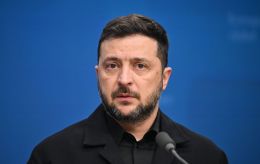Three weeks of blockade: Why border with Poland is "standing" and how it affects Ukraine?
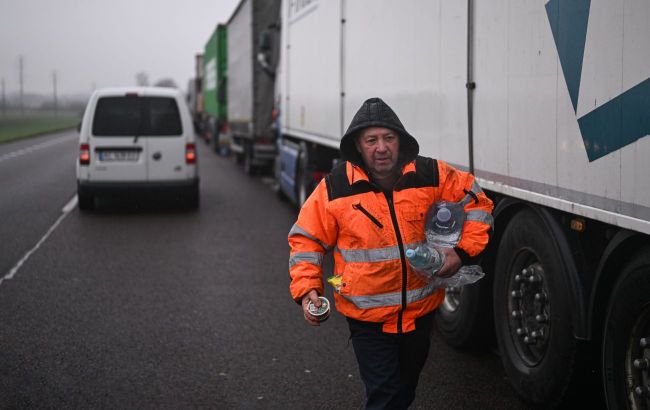 Blockade of border between Poland and Ukraine (Photo: Getty Images)
Blockade of border between Poland and Ukraine (Photo: Getty Images)
The blockade of the Polish-Ukrainian border has been ongoing for almost three weeks. Drivers find themselves in a difficult situation, and the Ukrainian side is preparing for evacuation, with economic losses already estimated in the hundreds of millions of euros.
More about the situation at the border, the impact on prices, and whether there is a threat of fuel and food shortages in the material from RBC-Ukraine.
In preparing the material, statements from the Deputy Minister of Infrastructure of Ukraine Serhiy Derkach, Vice President of the Association of International Road Carriers Volodymyr Balin, appeals from the Federation of Employers to President Volodymyr Zelenskyy and the head of the European Commission Ursula von der Leyen, comments from the spokesperson for the State Border Guard Service Andriy Demchenko, the director of the "Consulting Group A-95" Serhii Kuyun, the CEO of the "Ukrainian Agrarian Business Club" (UABC) Oleh Khomenko, and the
What is happening at the border?
The situation on the border from the Polish side remains challenging. Since November 6, protesters have been blocking trucks in front of Ukrainian checkpoints Krakovets, Yahodyn, and Rava Ruska. According to border guards, there are about 2300 trucks in queues, with the majority heading towards Krakovets.
"We note a slight movement, but it is ongoing. Within an hour, the Polish side can allow several trucks to pass in both directions across the border. It could be 2, 5, 8. It varies at different hours. However, this does not add to the intensity. For example, in the past 24 hours, 150 trucks passed through Yahodyn in both directions across the border. Before the blockade, 1200-1300 trucks crossed the border here. The movement is more or less intensive in the direction of the Krakovets checkpoint," commented Andriy Demchenko, the State Border Guard Service spokesperson, in an interview with RBС-Ukraine.
The blockade of another checkpoint, Medyca, adjacent to Shehyni, has started.
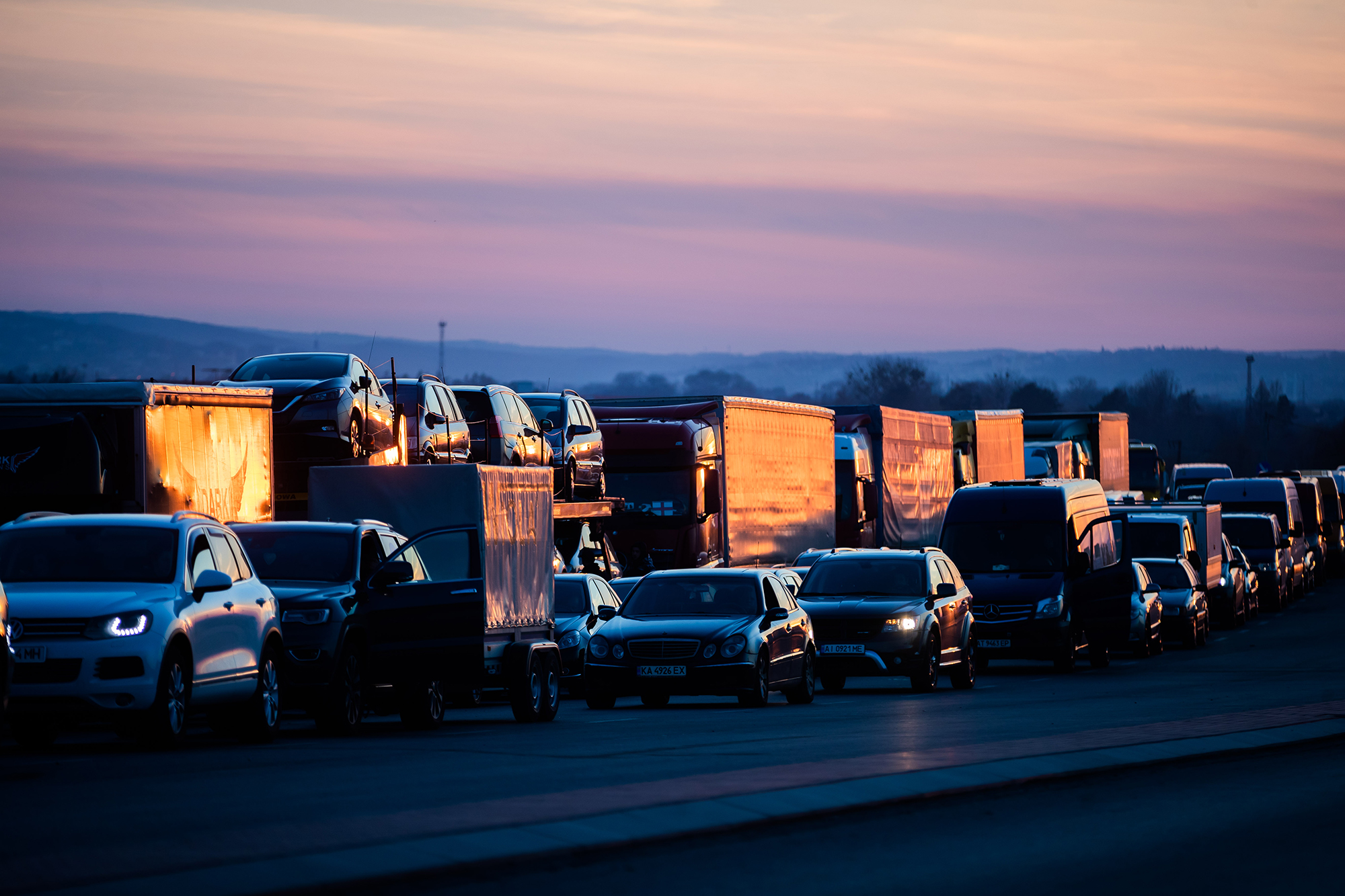
Photo: Thousands of drivers are stuck at the Polish border (Getty Images)
The blockade is announced to last until November 26. Still, it may take place during the daytime since the Polish side announced the unblocking of movement at 21:00. As of the morning, there were 1400 freight vehicles towards Ukraine on the territory of Poland in this direction.
Yesterday, it became known that the strike at Medyca may last until January. Also, there is information that the blockade may affect the Malhovitse checkpoint (opposite Nizhankovychi). Due to problems at other checkpoints, the electronic queue for leaving Ukraine has already grown to 2000 vehicles there.
Due to the actions of Polish strikers, drivers are trying to enter Ukraine through Slovakia and Hungary. Last week, the Union of Carriers of Slovakia blocked the Vyšné Nemecké checkpoint opposite Uzhgorod for an hour as a warning. On November 21, the movement was clogged again, but the Ukrainian-Slovak border is currently unblocked, and trucks are passing in regular mode.
According to Demchenko, as of the morning of November 24, there were about 400 trucks near the Vyšné Nemecké checkpoint. In the direction of the Tysa checkpoint on the border with Hungary, there were 460 trucks.
"If we talk more specifically about the border section with Slovakia, in recent days, we have observed intense truck traffic. There is no blockade. But, of course, this direction has become more loaded due to the situation on the border with Poland," he added.
Earlier, Ukrainian carriers held pickets near Krakovets. As of now, there is no action at Ukrainian checkpoints.
What do the strikers want, and why can they not agree?
Polish carriers put forward several demands:
- Return of permits for Ukrainian carriers.
- Strengthening the transport rules under the European Conference of Ministers of Transport (ECMT) for the Ukrainian side.
- Prohibition of a carrier company registration in Poland if its financial activities are not conducted within the EU territory.
- Separate queue for vehicles with EU country license plates.
- Separate queue for empty trucks.
- Access to the Ukrainian "Shlyakh" system.
These demands are discriminatory towards Ukraine and essentially attempt to annul the visa-free transport with the European Union. The interest of Polish companies in involving Ukrainian drivers in their work is evident in the request for access to the "Shlyakh" system. It is important to note that men cannot freely leave the country during martial law. Special humanitarian and medical cargo permits are processed precisely through the "Shlyakh" system.
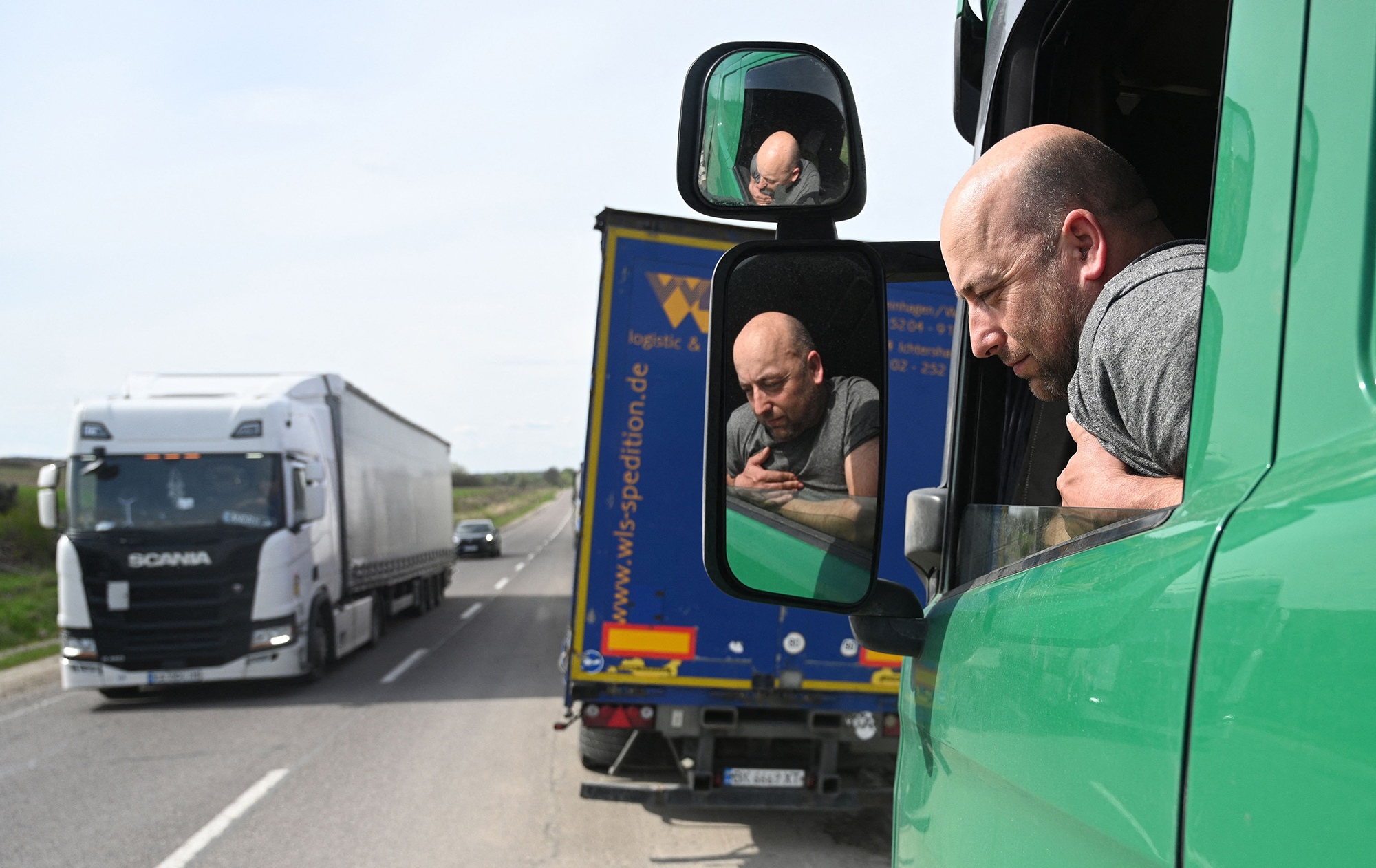
Photo: Polish carriers are unhappy with the competition with Ukrainians (Getty Images)
The strikers complain about losing the market to Ukrainian companies taking over orders. According to them, they cannot compete when Polish drivers are paid €2500 per month, while Ukrainian drivers receive €700. However, as stated by the EU Directorate, the permit system cannot be a subject of discussion, as the liberalization of freight transport between Ukraine and the EU is valid until June 30, 2024.
Due to the blockade, fuel, and humanitarian aid trucks are stuck in queues. Ukraine's Deputy Minister of Infrastructure, Serhiy Derkach, proposed creating an EU monitoring group.
"We propose to our European colleagues to officially record the situation in front of the checkpoints. Whether dangerous goods are allowed through, how humanitarian aid crosses the border, and most importantly, under what conditions our drivers have been for more than two weeks," he said.
On the other hand, Ukraine essentially has no one to negotiate with Poland. After the elections, the old government resigned, and the new one has not yet been formed. According to Derkach, requests have been sent to the local authorities of Lublin and Subcarpathian Voivodeship to provide necessary conditions for drivers.
"As for talking about unblocking, probably we will do it with the new government," he added.
The new government is expected to be formed by the parties "Civic Platform," "Third Path," and "Livytsia." They have already agreed on a coalition, and Donald Tusk will head the cabinet. However, the actual change of power will only take place in mid-December.
Humanitarian crisis and evacuation
During the nearly three weeks of the blockade, two drivers have died. In particular, on November 12, it became known about the death of a 54-year-old Ukrainian who had arrived at a parking lot in Khelm, where he was waiting in line to cross the border. Yesterday, a Ukrainian driver in a truck with Kharkiv license plates died at the parking lot near the Korchova checkpoint (opposite Krakovets).
"Most likely, the reasons are physiological, but in any case, the stress they receive through this strike, being forced to live in cabins and not knowing when they will be able to enter Ukraine, adds negativity and creates certain situations," said the Vice President of the Association of International Carriers, Volodymyr Balin.
.jpg)
Photo: Ukrainian drivers can be evacuated from the border at will (Getty Images)
The Ukrainian embassy appealed to the Ministry of Foreign Affairs, the Ministry of Internal Affairs, and the administration of the President of Poland to facilitate lifting the blockade. At the same time, a decision has been made to evacuate those who are willing.
To do this, one needs to fill out the corresponding form, which can be done by both drivers and carrier companies.
"We have started collecting data for the evacuation of our drivers. Our time for reaching compromises has run out. Now our drivers, in subzero temperatures, suffer from the actions of several individuals who blocked the border with the consent of local authorities," emphasized Deputy Minister of Infrastructure Serhiy Derkach.
Losses in the hundreds of millions: how the blockade affects the economy of Ukraine
The blockade of the border threatens dangerous consequences for Ukraine's economy and national security. In connection with this, the Federation of Employers and the Association of International Road Carriers have addressed President Volodymyr Zelenskyy and the President of the European Commission, Ursula von der Leyen.
According to preliminary estimates, the direct approximate losses to the economy of Ukraine already exceed 400 million euros. Indirect losses (fines and penalties for contract breaches, refusal to conclude contracts with Ukrainian counterparts for 2024) could amount to billions of euros.
It is emphasized that visa-free transport in no way violates the principles of fair competition in the European market, providing the opportunity for transport without additional permits between Ukraine and Poland and in transit.
Ukrainian carriers request to ensure order at checkpoints, direct the Red Cross and other humanitarian organizations to assist drivers, etc.
"The consequences of the border blockade are so significant that they require personal intervention by the heads of states and the interaction of authorities at all levels," the statement said.
How the blockade affected fuel prices and the threat of shortages
According to the director of the "Consulting Group A-95", Serhii Kuyun, the blockade of the Polish border has led to a deficit of autogas and a 30% price increase. About a third of this type of fuel comes from Poland, making it very difficult to replace the volumes in a short time. Due to the deficit, prices have increased on average from 27 to 35 hryvnias per liter.
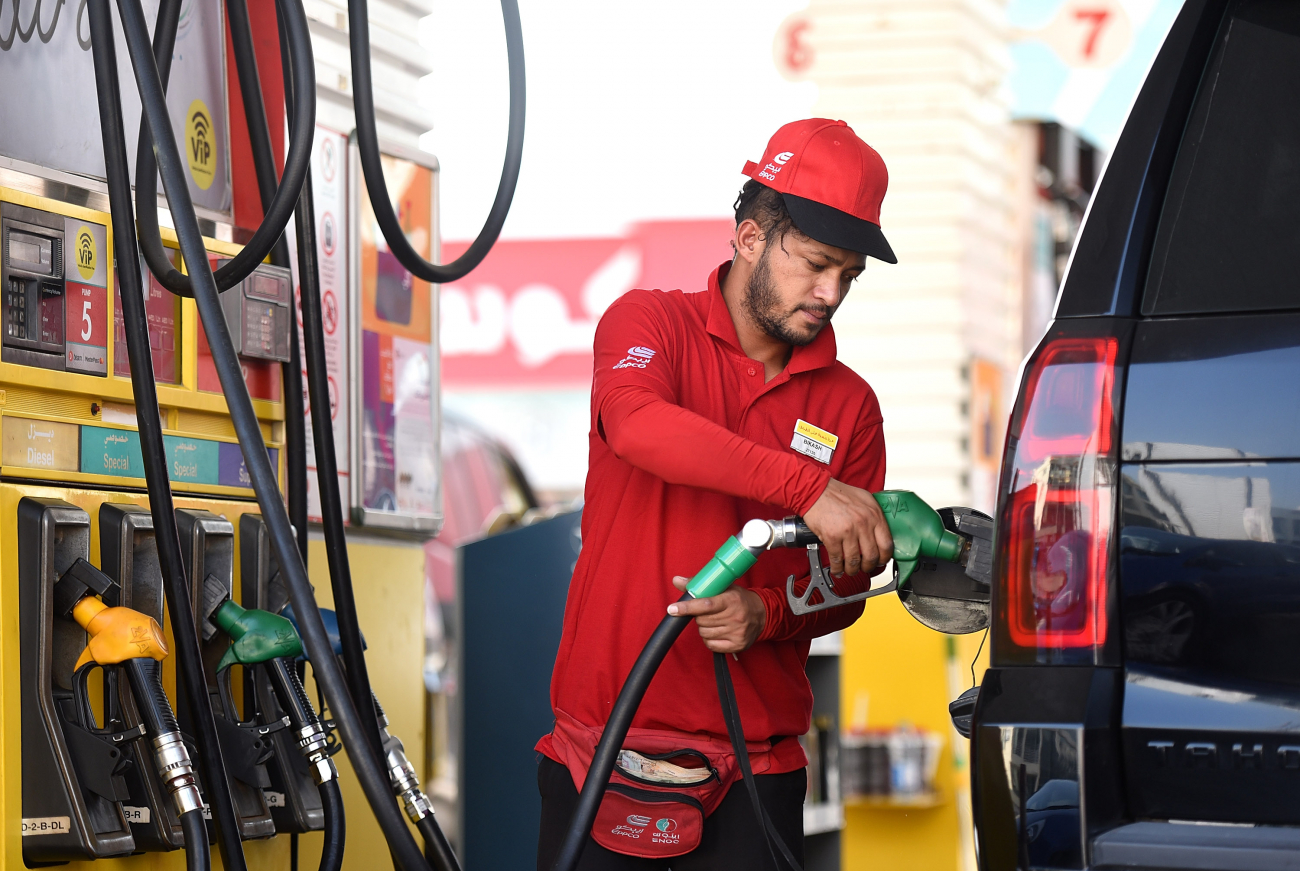
Photo: Prices at gas stations are rising only for automotive gas (Getty Images)
In addition, queues at the border started in October due to increased agricultural exports. As a result, gas trucks were making, at best, one trip per month, four times less. Traders are trying to import fuel by rail and are exploring alternative routes through Slovakia and Romania, negotiating with Northern European countries.
"There was an illusion that we had already passed the peak of the crisis in the liquefied gas market. But, as fresh monitoring of the situation shows, it is still too early to talk about it," he wrote on his Facebook.
In half of the regions, autogas disappeared from the Privat gas station network, and where it remained, it reached 39.6 hryvnias per liter. Supply disruptions are recorded at the UPG, Socar, Motto, BRSM, and Avantazh networks.
At the same time, gasoline and diesel prices are falling.
According to him, supplies from Poland account for up to 10% of the overall structure, and it is much easier to replace them, and the market has done so by redirecting imports by rail and to other countries. The expert predicts prices will fall by 2 hryvnias in the next two weeks.
"We were helped by the fact that the price of oil and oil products on the world market has significantly decreased. If it was $95 per barrel at the peak in September, today it is $80. And accordingly, purchase prices are decreasing," he said in a comment to RBC-Ukraine.
Will food prices rise, and what may disappear from the shelves?
The blockade has already affected the volume of food imports from Europe. Oleh Khomenko, the Ukrainian Agribusiness Club (UABC) CEO, describes the situation as critical.
"Thousands of trucks are standing in queues on both sides of the border. Given the circumstances, the production flow from Europe along blocked routes has decreased significantly, leading to additional costs for both Ukrainian and European producers," he explained to RBC-Ukraine.
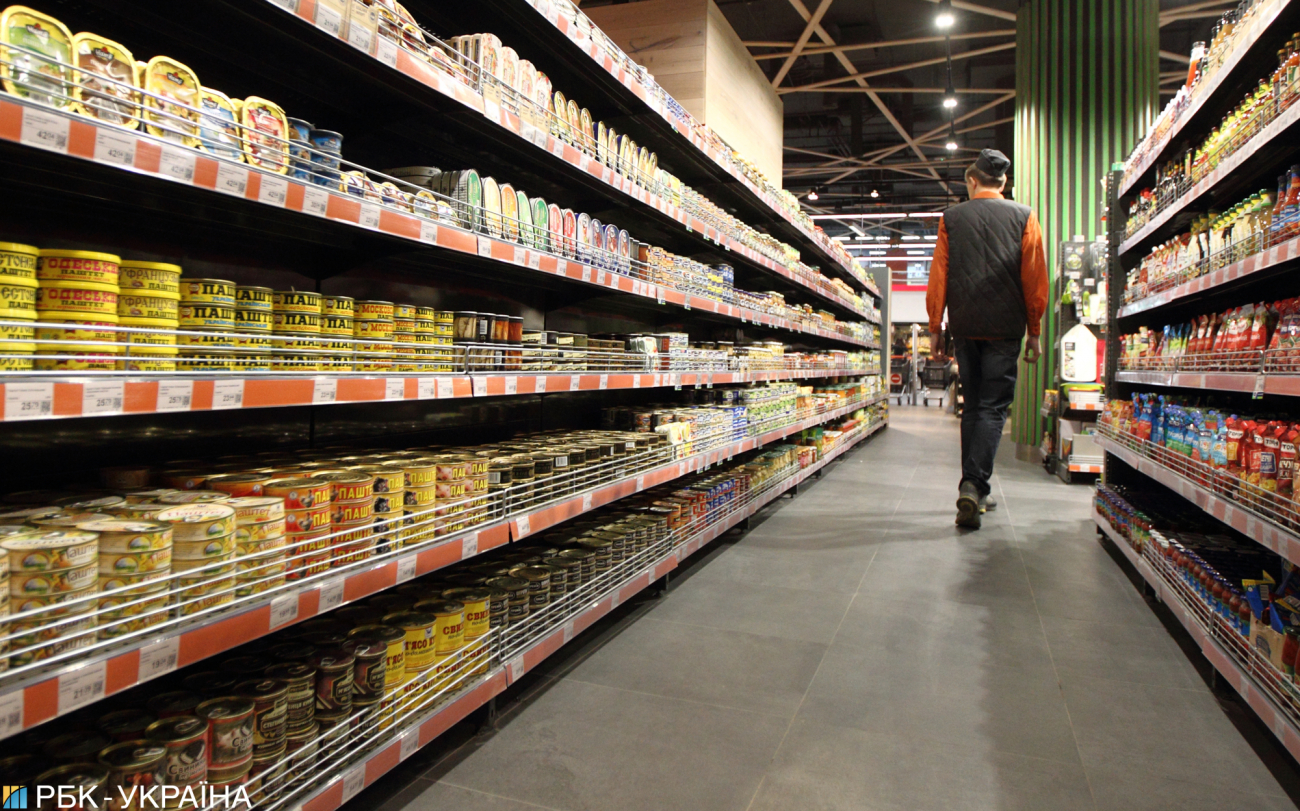
Photo: Ukraine is not yet facing a food shortage (Vitalii Nosach/RBC-Ukraine)
According to him, disruptions and downtime will not lead to anything good. Moreover, the cooling weather results in additional costs that will impact the cost of production, and ultimately, consumers will pay for it. At the same time, it is currently challenging to assess the consequences and overall losses from the disruption of this logistic chain.
While there is no observed deficit yet, Polish dairy, meat products, and egg, producers are well-represented in Ukrainian supermarkets, and there is a positive trend in consumer preferences for such products.
"Therefore, the border blockade may lead to the disappearance of certain goods from store shelves. I repeat that both Polish and Ukrainian producers suffer from this," he noted, adding that since Ukraine produces the majority of food products, there is no threat to food security.
In this situation, farmers suffer, and it is also important to remember that agricultural exports are a crucial part of the inflow of funds into the state budget. Therefore, the border blockade will undoubtedly have a negative impact on Ukraine's economic stability.
According to Denys Marchuk, the Deputy Chairman of the All-Ukrainian Agrarian Council (VAR), about 80% of the consumed products are produced within the country, and there is no expectation of a significant deficit, except for particular items.
"It could be fish, which is partially imported, dairy products... Perhaps, it might be limited to indicators for redfish, oysters, and squid. Such 'overseas things.' But how critical it will be is challenging to say right now," he added in an interview with RBC-Ukraine.
Those interviewed by RBC-Ukraine agree that the longer the blockade of the Polish border continues, the worse the situation will become.

